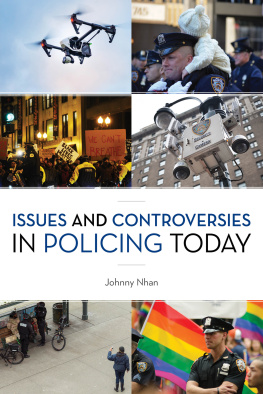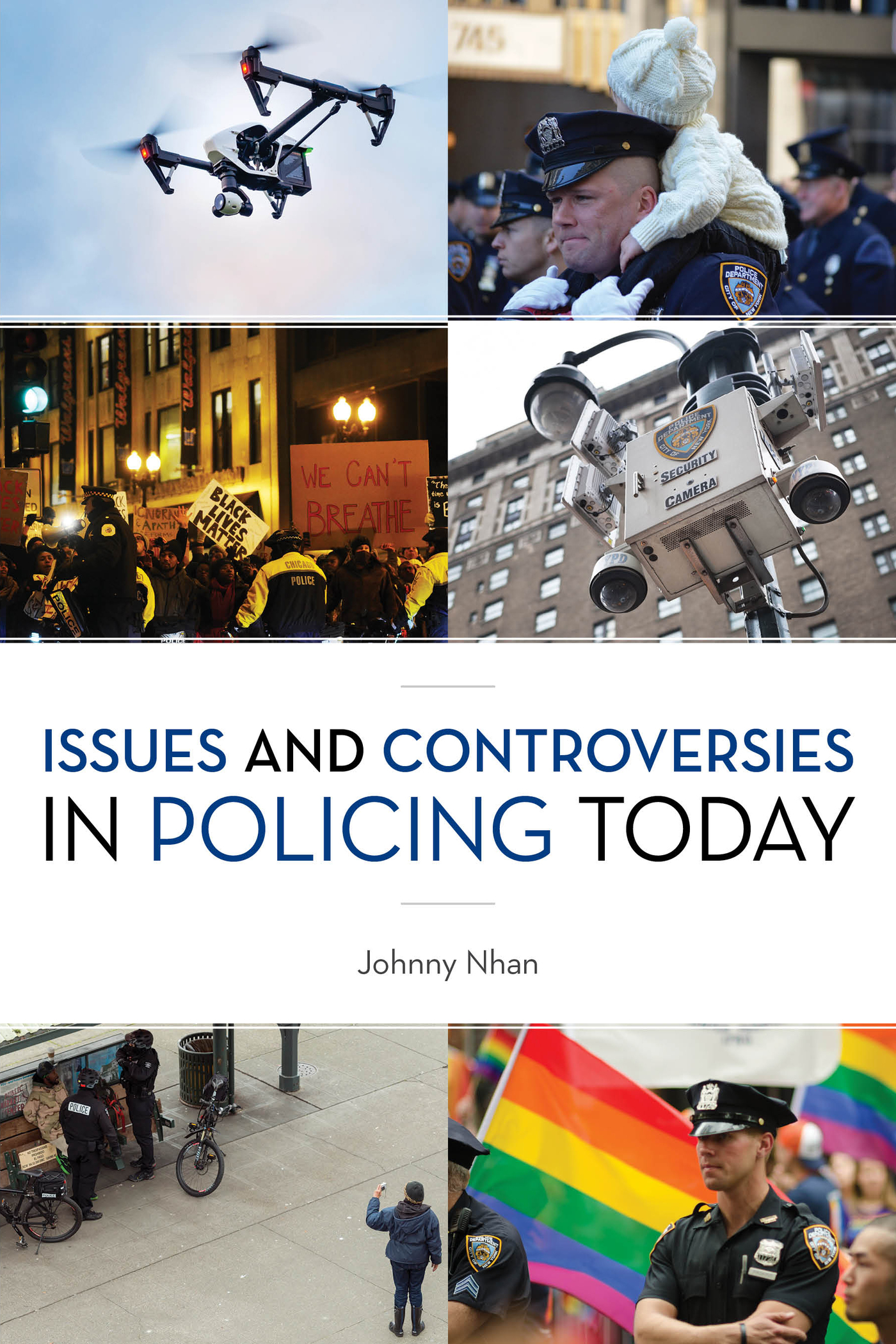Praise for Issues and Controversies
in Policing Today
Perhaps at no point in the history and evolution of modern policing has the profession faced so many challenges in such a short span of time as has been evident in the early part of the twenty-first century. Johnny Nhans work in Issues and Controversies in Policing Today is a bold and refreshing approach to the myriad challenges that face the police and society today, and allows the reader to see what works in policing and, more importantly, what does not. The material is presented in a conversational tone that promotes learning over memorization, and is an excellent choice for criminal justice related courses that attract a multidisciplinary audience. James J. Drylie, PhD, Fulbright Police Scholar, Kean University
Nhans book, Issues and Controversies in Policing Today, is a must-read for anyone interested in learning more about the ins and outs of being a police officer. Nhan takes the reader on a journey through the origins of police forces, media portrayals of the police, and the often invisible stresses of the job, including working swing shifts. Unexpected insights with every page turned. Angela J. Hattery, PHD, professor, women and gender studies, George Mason University; coauthor, Policing Black Bodies: How Black Lives Are Surveilled and How to Work for Change
Issues and Controversies in Policing Today by Professor Johnny Nhan tells the story of why it is a book that meets the criteria of explaining to the reader what it takes to become a police officer in twenty-first-century America. Taking a socio-historical approach, Nhan provides critical information on the origins of policing, the way ethnic minority and gay police officers must navigate both those they serve and protect and fellow officers. He takes us on a discussion of the controversial strategy of community policing that is quite illuminating. Issues and Controversies in Policing Today is a must-read as it is a well-crafted, insightful, and easy to read book. Earl Smith, PhD, professor of sociology and women and gender studies, George Mason University; coauthor, Policing Black Bodies: How Black Lives Are Surveilled and How to Work for Change
Policing in our times has certainly become controversial and due to the nature of policing in America, it is plagued by many issues, both societal and organizational. Fortunately, for the student of policing, Johnny Nhan has come along with a book that not only catalogues all of these issues and controversies but presents them in a readable format, providing the multi-faceted perspective of each issue and controversy. Nhans Issues and Controversies in Policing Today is the book that will inform, educate, and start the much-needed discussion on American policing today. Willard M. Oliver, Sam Houston State University
Nhans Issues and Controversies in Policing Today addresses many issues, including the politics of policing and LGBTQ police officers, that are not often discussed about the field of law enforcement. It is a welcomed addition to any Foundations of Policing course and could be utilized as the primary text to support any Special Issues in Policing course. Kimberly A. McCabe, PhD, professor of criminology, University of Lynchburg
Issues and Controversies in
Policing Today
Issues and Controversies in
Policing Today
Johnny Nhan
ROWMAN & LITTLEFIELD
Lanham Boulder New York London
Published by Rowman & Littlefield
An imprint of The Rowman & Littlefield Publishing Group, Inc.
4501 Forbes Boulevard, Suite 200, Lanham, Maryland 20706
www.rowman.com
6 Tinworth Street, London SE11 5AL
Copyright 2019 by The Rowman & Littlefield Publishing Group, Inc.
All rights reserved. No part of this book may be reproduced in any form or by any electronic or mechanical means, including information storage and retrieval systems, without written permission from the publisher, except by a reviewer who may quote passages in a review.
British Library Cataloguing in Publication Information Available
Library of Congress Cataloging-in-Publication Data
Names: Nhan, Johnny, 1977- author.
Title: Issues and controversies in policing today / Johnny Nhan.
Description: Lanham, Maryland : Rowman & Littlefield, [2019] | Includes bibliographical references and index.
Identifiers: LCCN 2018054397 (print) | LCCN 2018057092 (ebook) | ISBN 9781538117552 (Electronic) | ISBN 9781538117545 (pbk. : alk. paper)
Subjects: LCSH: Police--United States. | Police administration--United States.
Classification: LCC HV8139 (ebook) | LCC HV8139 .N43 2019 (print) | DDC 363.2/30973--dc23
LC record available at https://lccn.loc.gov/2018054397
 TM The paper used in this publication meets the minimum requirements of American National Standard for Information Sciences Permanence of Paper for Printed Library Materials, ANSI/NISO Z39.48-1992.
TM The paper used in this publication meets the minimum requirements of American National Standard for Information Sciences Permanence of Paper for Printed Library Materials, ANSI/NISO Z39.48-1992.
Printed in the United States of America
Chapter 1
Introduction
This chapter introduces the most visible and often controversial part of the criminal justice system: the police. Specifically, the role of American policing will be explored, focusing on the unique societal functions of the police and powers granted to them by law.
Topics explored in this chapter:
Social Contract
Social contract, as written by French Enlightenment philosopher Jean-Jacques Rousseau, is the tacit agreement of relational arrangement between individuals and society. In order to live in civilized society, individuals must forego some personal liberties, such as the ability to wage vigilante justice. In return, individuals are granted the benefits of civilized life, which includes safety. In other words, you give up a number of freedoms to _____ in exchange for freedom from ______. The state (a term used to describe government in general), takes over justice duties, such as apprehending and punishing law-breakers. Therefore, one of the freedoms under social contract is the freedom from crime and violence. Notice that in criminal cases, the state is the primary plaintiff. For example, a murder case may be labeled State of Texas vs. Smith, versus civil cases where individuals file suits against other individuals, such as Wilson vs. Smith.
The concept of social contract came about during the Age of Enlightenment, or the Age of Reason, a period of radical change in Europe during the seventeenth and eighteenth centuries. This period of time was considered a social and cultural renaissance that stressed modern concepts such as free thought, free will, and individualism. This belief in individual agency was in stark contrast to the days of the Middle Ages, a period of time that was dictated by religious dogma that oppressed creativity and intellect and that preceded the Age of Enlightenment. Instead, the Enlightenment period stressed creative arts, science, and other expressions of free will and thought. Moreover, the Age of Enlightenment was also considered the birth of westernized thinking that manifests in todays laws, with concepts such as no cruel and unusual punishment, freedom ofspeech



 TM The paper used in this publication meets the minimum requirements of American National Standard for Information Sciences Permanence of Paper for Printed Library Materials, ANSI/NISO Z39.48-1992.
TM The paper used in this publication meets the minimum requirements of American National Standard for Information Sciences Permanence of Paper for Printed Library Materials, ANSI/NISO Z39.48-1992.